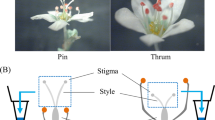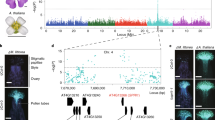Abstract
The pollen–stigma interaction of self-incompatibility in the mustard family Brassicaceae is controlled by the S locus. Nearly fifty allelic variants at this locus control the specificity of this interaction. Identity of alleles in pollen and stigma results in an incompatible reaction and the arrest of pollen development. Genetic and developmental analyses of self-incompatibility in Brassica have identified a class of stigma glycoproteins exhibiting allele-specific isoforms as being among the products of the S-locus1–3. A cDNA clone encoding one of these S-locus specific glycoproteins has been isolated from B. oleracea4, and recently, N-terminal protein sequence analysis has shown extensive similarity between three S-locus specific glycoproteins from B. campestris5. Here, we describe cDNA clones encoding such glycoproteins from three different S-allele homozygous genotypes, and report the complete amino-acid sequence of the glycoproteins based on the nucleotide sequence of the cDNA clones. We identify allele-encoded differences in the protein sequences which may be relevant to the allelic specificity of the stigma component of the pollen–stigma interaction. The sequences from the sporophytically determined incompatibility system of Brassica show no similarity to the reported S-locus-associated cDNA sequence of the gametophytic Nicotiana self-incompatibility type6.
This is a preview of subscription content, access via your institution
Access options
Subscribe to this journal
Receive 51 print issues and online access
$199.00 per year
only $3.90 per issue
Buy this article
- Purchase on Springer Link
- Instant access to full article PDF
Prices may be subject to local taxes which are calculated during checkout
Similar content being viewed by others
References
Nishio, T. & Ninata, K. Heredity 38, 391–396 (1977).
Nasrallah, J. B. & Nasrallah, M. E. Experientia 40, 279–281 (1984).
Nasrallah, J. B., Doney, R. C. & Nasrallah, M. E. Planta 165, 100–107 (1985).
Nasrallah, J. B., Kao, T.-H., Goldberg, M. L. & Nasrallah, M. E. Nature 318, 263–267 (1985).
Takayama, S. et al. Agric. Biol. Chem. 50, 1365–1367 (1986).
Anderson, M. A. et al. Nature 321, 38–44 (1986).
Nasrallah, J. B., Kao, T.-H., Goldberg, M. L. & Nasrallah, M. F. Nature 326, 523 (1987), (corrigendum).
Nishio, T. & Hinata, K. Genetics 100, 641–647 (1982).
Takayama, S. et al. Agric. biol. Chem. 50, 1673–1676 (1986).
Neuberger, A., Gottshalk, A., Marshall, R. D. & Spiro, R. G. in The Glycoproteins: Their Composition, Structure and Function Part A (ed. Gottshalk, A.) 450–490 (Elsevier, Amsterdam, 1972).
Sanger, F., Coulson, A. R., Barrell, B. G., Smith, A. J. H. & Rose, B. J. molec. Biol. 143, 161–178 (1980).
Kyte, J. & Doolittle, R. F. J. molec. Biol. 157, 105–132.
Author information
Authors and Affiliations
Rights and permissions
About this article
Cite this article
Nasrallah, J., Kao, TH., Chen, CH. et al. Amino-acid sequence of glycoproteins encoded by three alleles of the S locus of Brassica oleracea. Nature 326, 617–619 (1987). https://doi.org/10.1038/326617a0
Received:
Accepted:
Issue Date:
DOI: https://doi.org/10.1038/326617a0
This article is cited by
-
Global allele polymorphism indicates a high rate of allele genesis at a locus under balancing selection
Heredity (2021)
-
Mechanism of self/nonself-discrimination in Brassica self-incompatibility
Nature Communications (2020)
-
Progress on deciphering the molecular aspects of cell-to-cell communication in Brassica self-incompatibility response
3 Biotech (2018)
-
Structural basis for specific self-incompatibility response in Brassica
Cell Research (2016)
-
Transcriptomic comparison of the self-pollinated and cross-pollinated flowers of Erigeron breviscapus to analyze candidate self-incompatibility-associated genes
BMC Plant Biology (2015)
Comments
By submitting a comment you agree to abide by our Terms and Community Guidelines. If you find something abusive or that does not comply with our terms or guidelines please flag it as inappropriate.



